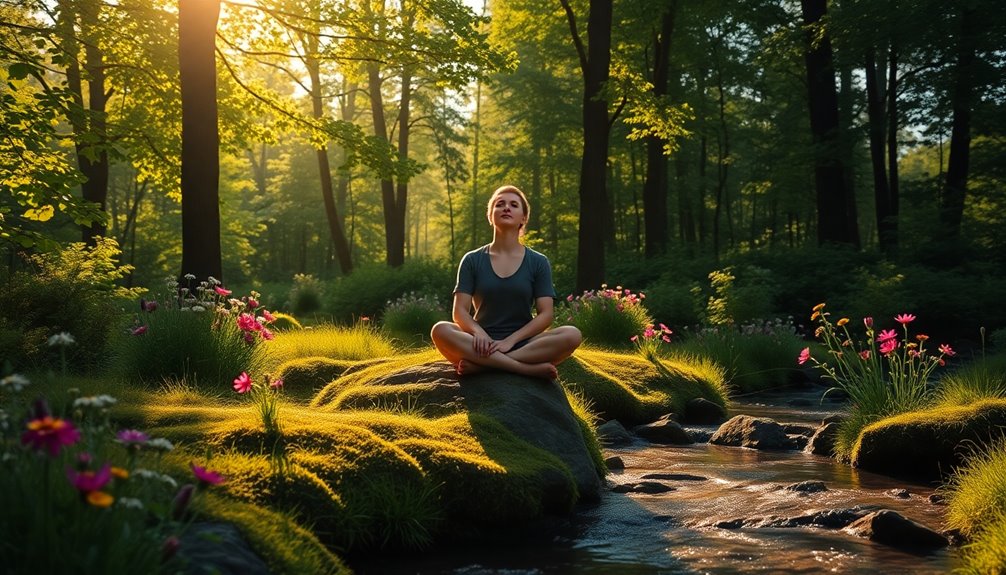Embracing original solitude is your pathway to self-discovery and personal growth. Alone time lets you reflect on your thoughts, values, and aspirations, enhancing your emotional resilience. During these quiet moments, you gain deeper insights into your identity and life purpose, ultimately boosting your creativity. To cultivate solitude, you can try mindful meditation, journaling, or simply enjoying nature walks. Overcoming any fear of being alone involves reframing your mindset and gradually increasing your alone time with engaging activities. Embrace the calm, and you may find profound insights waiting for you as you explore this enriching experience further.
Understanding Original Solitude
Many people overlook the power of original solitude, often viewing alone time as something to be avoided.
However, exploring solitude philosophy reveals its significance across historical perspectives. Think of figures like Thoreau or Nietzsche, who embraced solitude as a pathway to profound self-discovery. They understood that alone time isn't just about being physically isolated; it's a chance to connect with your inner self. When you spend time alone, you can reflect on your thoughts, values, and aspirations without external distractions. This practice of reflection can help you identify necessary adjustments in your life and goals. Embracing this form of solitude can enhance your emotional resilience, allowing you to better navigate life's challenges.
This historical appreciation for solitude encourages you to rethink your own relationship with being alone. Instead of fearing it, consider original solitude as an opportunity to explore your identity and cultivate deeper insights about your life and purpose. Embracing this time can lead to radical self-acceptance, fostering emotional well-being and enhancing your overall self-awareness.
Benefits of Alone Time
Alone time offers you a chance to reflect on your thoughts and feelings, enhancing your self-awareness. It also sparks creativity, allowing your mind to explore new ideas without distractions. Plus, taking a break from the hustle can greatly reduce your stress levels, helping you recharge and focus. Additionally, embracing alone time can foster personal growth by encouraging you to step outside your comfort zone and engage in self-reflection. Moreover, incorporating mindfulness practices during this time can maximize the benefits of solitude, enhancing mental clarity and emotional balance. Engaging in self-reflection during alone time provides an opportunity to acknowledge personal roles in past events, facilitating deeper understanding and growth.
Enhances Self-Reflection
When you carve out time for yourself, it opens the door to deeper self-reflection and understanding. This alone time allows you to engage in self-awareness exercises that can clarify your thoughts and feelings.
By stepping away from distractions, you can examine your beliefs, values, and goals more closely. You'll discover patterns in your behavior, enabling personal growth.
Without the noise of daily life, you have the space to evaluate your experiences and decisions. This introspection helps you identify areas for improvement and acknowledge your strengths.
Embracing solitude fosters a profound connection with yourself, leading to increased clarity and confidence. Ultimately, enhancing self-reflection empowers you to navigate your journey with intention and purpose.
Boosts Creativity
Solitude can spark your creativity in ways you mightn't expect. When you carve out time for yourself, you open the door to creative inspiration.
In solitude spaces, your mind can roam freely, allowing ideas to flow without distractions. You might find that your best thoughts emerge when you're alone, as your brain can connect dots that often go unnoticed in a busy environment.
Embracing alone time gives you the chance to explore your passions and think outside the box. Whether it's writing, painting, or brainstorming, solitude cultivates an atmosphere where innovation thrives.
Reduces Stress Levels
Finding peace in your own company can greatly reduce stress levels.
When you take time alone, you create a space for effective stress management. This solitude allows you to step back from life's chaos, giving your mind a chance to unwind.
You'll discover that reflecting on your thoughts helps you process emotions, leading to greater emotional resilience.
Techniques for Cultivating Solitude

To truly embrace solitude, you can practice a few techniques that foster self-discovery. Mindful meditation, nature immersion, and journaling are effective ways to connect with your inner self. Additionally, incorporating daily exercise into your routine can enhance your mental clarity and overall well-being during moments of solitude. Engaging in deep breathing techniques can further promote a sense of calm and focus, enriching your solitary experiences. Practicing mindfulness and stillness allows for deeper self-reflection and appreciation of your thoughts and feelings.
Mindful Meditation Practices
While you may think of meditation as simply a way to relax, it can also serve as a powerful tool for cultivating solitude and self-discovery. By incorporating mindful breathing into your routine, you can deepen your connection with yourself.
Start by finding a quiet space where you won't be disturbed. Close your eyes, inhale deeply through your nose, and exhale slowly through your mouth. Focus on each breath, letting go of distractions.
Explore different meditation techniques, like body scans or loving-kindness meditation, to enhance your practice. As you become more attuned to your inner thoughts and feelings, you'll discover valuable insights about yourself.
Embrace these moments of solitude, and watch your self-awareness blossom.
Nature Immersion Activities
Engaging with nature offers a unique opportunity to embrace solitude and enhance self-discovery. You can start with nature walks, where each step connects you to the earth. As you move through forests or along rivers, pay attention to your surroundings; the rustling leaves and gentle breeze can ground you in the moment.
Consider planning wilderness retreats, where you immerse yourself in the beauty of untouched landscapes. These retreats provide the space to reflect and recharge away from daily distractions.
Whether it's hiking, birdwatching, or simply sitting in silence, these activities allow you to reconnect with your inner self. Embracing this solitude nurtures your spirit and fosters clarity, making way for profound insights and personal growth.
Journaling for Reflection
Journaling serves as a powerful tool for reflection and self-discovery, allowing you to explore your thoughts and emotions in a structured way. By implementing various journaling techniques, you can deepen your understanding of yourself.
Start with reflective prompts like "What am I grateful for today?" or "What challenges did I face, and how did I overcome them?" These questions invite insight and clarity.
Set aside dedicated time each day, creating a quiet space to write without distractions. You might try free writing, stream-of-consciousness entries, or bullet journaling to keep it fresh.
As you commit to this practice, you'll find that your solitude transforms into a journey of self-exploration, helping you uncover layers of your identity.
Overcoming Fear of Being Alone
Although the prospect of spending time alone can be intimidating, embracing these moments is essential for personal growth. Overcoming the fear of being alone starts with understanding that solitude can lead to self-discovery and empowerment.
Here are three strategies for effective fear management:
- Reframe Your Mindset: Shift your perception of solitude from loneliness to positive solitude, focusing on the benefits it brings. Engaging in mindfulness techniques can help reduce stress and enhance your experience of solitude. Practicing self-approval allows you to acknowledge and appreciate your own company.
- Set Small Goals: Begin with short periods alone, gradually increasing the duration as you become more comfortable with your own company.
- Engage in Activities: Use your alone time to explore hobbies or interests that enrich your life, helping you appreciate the value of solitude.
Incorporating mindfulness practices can further enhance your experience of solitude, allowing for deeper reflection and self-understanding.
Facing your fears can transform your relationship with solitude, leading to a deeper understanding of yourself.
Solitude and Creativity

When you find yourself in solitude, it opens the door to a world of creativity that often goes unnoticed in the hustle of daily life.
Embracing this alone time allows your mind to wander freely, sparking innovative ideas and unique perspectives. You tap into solitude benefits like enhanced focus and deeper reflection, which fuel your creative inspiration. Engaging in motivation techniques can also help you make the most of this time. Additionally, the journey of self-discovery can lead to a greater understanding of your personal passions and interests.
With fewer distractions, your thoughts can flow more easily, leading to breakthroughs that you might miss in a crowded environment. Use this time to explore your passions, experiment with new concepts, or simply daydream. Engaging in self-awareness and honesty can further enhance your creative processes, allowing for more authentic expression.
Integrating Solitude Into Daily Life
Integrating solitude into your daily life can be a transformative practice that enhances your well-being. By carving out time for yourself, you nurture self-awareness and clarity.
Here are three ways to incorporate solitude rituals into your daily practices:
- Morning Reflection: Set aside 10 minutes each morning for quiet reflection or journaling. This helps center your thoughts for the day ahead.
- Nature Walks: Spend time alone in nature, allowing the environment to inspire and rejuvenate you.
- Digital Detox: Designate a time each day to unplug from technology, creating a space for introspection and creativity.
Conclusion
Embracing original solitude is like tending to a garden where your thoughts can bloom freely. By carving out time for yourself, you release the vibrant colors of self-discovery and creativity. Don't shy away from the stillness; instead, dance with it, letting it guide you to deeper understanding. As you weave moments of solitude into your daily life, you'll find that being alone doesn't mean loneliness—it's an invitation to explore the rich landscape of your own soul.



